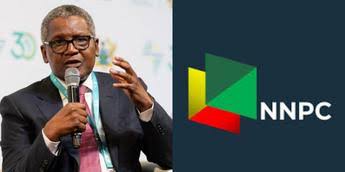The plea to amend the suit followed an application by the NNPCL before Justice Inyang Ekwo of a Federal High Court in Abuja, urging the court to strike out the case for being incompetent.
The News Agency of Nigeria (NAN) reports that Dangote Refinery had sued Nigeria Midstream and Downstream Petroleum Regulatory Authority (NMDPRA) and Nigeria National Petroleum Corporation Limited (NNPCL) as 1st and 2nd defendants.
Also listed as 3rd to 7th defendants respectively in the originating summons, marked: FHC/ABJ/CS/1324/2024 and dated Sept. 6, are AYM Shafa Limited, A. A. Rano Limited, T. Time Petroleum Limited, 2015 Petroleum Limited, and Matrix Petroleum Services Limited.
The oil company, through its lawyer, Ogwu Onoja, SAN, prayed the court to nullify import licences issued by NMDPRA to the NNPCL and the five other companies for the purpose of importing refined petroleum products.
The company (plaintiff) also prayed the court to declare that NMDPRA was in violation of Sections 317(8) and (9) of the Petroleum Industry Act (PIA) by issuing licenses for the importation of petroleum products.
It stated that such licenses should only be issued in circumstances where there is a petroleum product shortfall.
It equally sought a N100 billion in damages against NMDPRA for allegedly continuing to issue import licences to NNPCL and the five companies for importing petroleum products.
But the NNPCL (2nd defendant), in its preliminary objection dated and filed Nov. 15, urged the court to strike out the suit.
It argued that the Nigeria National Petroleum Corporation Limited (NNPC) sued by the refinery was non-existent entity.
The company, through its lawyer, Kehinde Ogunwumiju, SAN, said the Nigerian National Petroleum Company Limited (NNPCL), being its registered name with the Corporate Affairs Commission, is not one and the same with the 2nd defendant sued by the plaintiff.
It further argued that the court lacked jurisdiction over the 2nd defendant sued as Nigeria National Petroleum Corporation Limited (NNPC).
“A simple search on the CAC website shows that there is no entity called ‘Nigeria National Petroleum Corporation Limited (NNPC),’” the 2nd defendant said.
The NNPCL, therefore, said that the 2nd defendant, as sued by the refinery in the instant suit, is not a competent party or a juristic person, urging the court to strike out its name or the suit in its entirety.
Meanwhile, the Dangote Refinery, in a motion on notice dated Nov. 25 but filed Nov. 28 by Onoja, sought an order, granting leave to the company to amend its originating summons in accordance with the rules of the court.
The refinery, in a copy of the motion sighted by NAN on Monday, said this would allow it to correct the name of the 2nd defendant to read; “Nigerian National Petroleum Company Limited,” instead of “Nigeria National Petroleum Corporation Limited (NNPC)” earlier listed.
In the affidavit in support of the motion deposed to by Vincent Sani, a litigation clerk in the law firm of Onoja, he said he was informed by one of their lawyers, Innocent Adoo, on Nov. 25 that after the filing of the originating processes in the suit, he observed that the 2nd defendant’s name was erroneously spelt, hence, the need for the amendment.
Sani averred that the said amendment had become necessary in order for the record of the court to bear the proper description of the 2nd defendant (NNPCL) as a party in the suit.
The litigation clerk said that the NNPCL was yet to be served with the said originating processes sought to be amended.
According to him, the proposed amended originating summons, affidavit in support and written address, are hereby exhibited and marked as “Exhibit A.”
Sani, who averred that the defendants/respondents would not be prejudiced if the application is granted, said that justice would be better served if their plea is considered.
NAN, however, observes that the proposed originating summons, filed on Nov. 28 and dated Sept. 6, seek the same reliefs with the earlier filed by the refinery.
It would be recalled that three oil marketers had also prayed the court to dismiss suit.
The oil marketers, in a joint counter affidavit marked: FHC/ABJ/CS/1324/2024 filed on Nov. 5 in response to Dangote Refinery’s originating summons, told Justice Ekwo that granting that application would spell doom for the country’s oil sector.
According to them, the plan to monopolise the oil sector is a recipe for disaster in the country.
The three marketers; AYM Shafa Limited, A. A. Rano Limited and Matrix Petroleum Services Limited, in their response, said the plaintiff did not produce adequate petroleum products for the daily consumption of Nigerians.
Besides, they argued that there was nothing placed before the court to prove the contrary.
Justice Ekwo had fixed Jan. 20, 2025 for report of settlement or service.(NAN)











